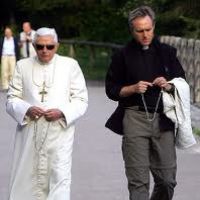The Pope's ENCYCLICAL LETTER CARITAS IN VERITATE, Charity in truth needs to be read in my view in conjuction with the Pope Benedict's last two Encyclicals. I think to do so helps to clarify the new encyclical and disminish some confusion in which is a dense theological document at times.
The problem with these encyclicals at times is that they operate in their own "language". A language that is not exactly easy to grasp upon first reading in some places. It is akin to the first time a Law Student reads a legal opinion from a Court. The first thought is I will never be able to do this. However before you know it what took hours to read(and pulling out the legal dictionary every five seconds) becomes second nature in less than a month or just weeks. Thankfully Pope Benedict Encyclicals don't even take that long to get do.w some of the new language one might be encountering for the first time. In fact Benedict has a great talent of making them accessible to the comman man.
Further one can see in a conistent theme in the Pope's writings. He has an overall point he is trying to get out and indeed they all interact with each other. I find the past two encyclial letters offer a great deal in helping to see what the Pope is trying to say in Caritas in Vertiate.
The Pope has written two previous Encyclicals. They are DEUS CARITAS EST (God Is Love) and SPE SALVI (In Hope We are Saved)
This shall be a two part posts. I fiest will deal with Deus Caritas Est which was signed by Pope Benedict on 25 December, the Solemnity of the Nativity of the Lord, in the year 2005.
The bolding is all mine.
In the effort of making this post as concise as possible I am not excerpting 13 through 18. However I think that should be read also since it deals with "love of Neighbor" which is a part of the Christain theological background that is at play. Besides the presvious mentioned paragraphs here is the part I think touches on the newest document.
Justice and Charity
26. Since the nineteenth century, an objection has been raised to the Church's charitable activity, subsequently developed with particular insistence by Marxism: the poor, it is claimed, do not need charity but justice. Works of charity—almsgiving—are in effect a way for the rich to shirk their obligation to work for justice and a means of soothing their consciences, while preserving their own status and robbing the poor of their rights. Instead of contributing through individual works of charity to maintaining the status quo, we need to build a just social order in which all receive their share of the world's goods and no longer have to depend on charity. There is admittedly some truth to this argument, but also much that is mistaken. It is true that the pursuit of justice must be a fundamental norm of the State and that the aim of a just social order is to guarantee to each person, according to the principle of subsidiarity, his share of the community's goods. This has always been emphasized by Christian teaching on the State and by the Church's social doctrine. Historically, the issue of the just ordering of the collectivity had taken a new dimension with the industrialization of society in the nineteenth century. The rise of modern industry caused the old social structures to collapse, while the growth of a class of salaried workers provoked radical changes in the fabric of society. The relationship between capital and labour now became the decisive issue—an issue which in that form was previously unknown. Capital and the means of production were now the new source of power which, concentrated in the hands of a few, led to the suppression of the rights of the working classes, against which they had to rebel.
27. It must be admitted that the Church's leadership was slow to realize that the issue of the just structuring of society needed to be approached in a new way. There were some pioneers, such as Bishop Ketteler of Mainz († 1877), and concrete needs were met by a growing number of groups, associations, leagues, federations and, in particular, by the new religious orders founded in the nineteenth century to combat poverty, disease and the need for better education. In 1891, the papal magisterium intervened with the Encyclical Rerum Novarum of Leo XIII. This was followed in 1931 by Pius XI's Encyclical Quadragesimo Anno. In 1961 Blessed John XXIII published the Encyclical Mater et Magistra, while Paul VI, in the Encyclical Populorum Progressio (1967) and in the Apostolic Letter Octogesima Adveniens (1971), insistently addressed the social problem, which had meanwhile become especially acute in Latin America. My great predecessor John Paul II left us a trilogy of social Encyclicals: Laborem Exercens (1981), Sollicitudo Rei Socialis (1987) and finally Centesimus Annus (1991). Faced with new situations and issues, Catholic social teaching thus gradually developed, and has now found a comprehensive presentation in the Compendium of the Social Doctrine of the Church published in 2004 by the Pontifical Council Iustitia et Pax. Marxism had seen world revolution and its preliminaries as the panacea for the social problem: revolution and the subsequent collectivization of the means of production, so it was claimed, would immediately change things for the better. This illusion has vanished. In today's complex situation, not least because of the growth of a globalized economy, the Church's social doctrine has become a set of fundamental guidelines offering approaches that are valid even beyond the confines of the Church: in the face of ongoing development these guidelines need to be addressed in the context of dialogue with all those seriously concerned for humanity and for the world in which we live.
28. In order to define more accurately the relationship between the necessary commitment to justice and the ministry of charity, two fundamental situations need to be considered:
a) The just ordering of society and the State is a central responsibility of politics. As Augustine once said, a State which is not governed according to justice would be just a bunch of thieves: “Remota itaque iustitia quid sunt regna nisi magna latrocinia?”.[18] Fundamental to Christianity is the distinction between what belongs to Caesar and what belongs to God (cf. Mt 22:21), in other words, the distinction between Church and State, or, as the Second Vatican Council puts it, the autonomy of the temporal sphere.[19] The State may not impose religion, yet it must guarantee religious freedom and harmony between the followers of different religions. For her part, the Church, as the social expression of Christian faith, has a proper independence and is structured on the basis of her faith as a community which the State must recognize. The two spheres are distinct, yet always interrelated.
Justice is both the aim and the intrinsic criterion of all politics. Politics is more than a mere mechanism for defining the rules of public life: its origin and its goal are found in justice, which by its very nature has to do with ethics. The State must inevitably face the question of how justice can be achieved here and now. But this presupposes an even more radical question: what is justice? The problem is one of practical reason; but if reason is to be exercised properly, it must undergo constant purification, since it can never be completely free of the danger of a certain ethical blindness caused by the dazzling effect of power and special interests.
Here politics and faith meet. Faith by its specific nature is an encounter with the living God—an encounter opening up new horizons extending beyond the sphere of reason. But it is also a purifying force for reason itself. From God's standpoint, faith liberates reason from its blind spots and therefore helps it to be ever more fully itself. Faith enables reason to do its work more effectively and to see its proper object more clearly. This is where Catholic social doctrine has its place: it has no intention of giving the Church power over the State. Even less is it an attempt to impose on those who do not share the faith ways of thinking and modes of conduct proper to faith. Its aim is simply to help purify reason and to contribute, here and now, to the acknowledgment and attainment of what is just.
The Church's social teaching argues on the basis of reason and natural law, namely, on the basis of what is in accord with the nature of every human being. It recognizes that it is not the Church's responsibility to make this teaching prevail in political life. Rather, the Church wishes to help form consciences in political life and to stimulate greater insight into the authentic requirements of justice as well as greater readiness to act accordingly, even when this might involve conflict with situations of personal interest. Building a just social and civil order, wherein each person receives what is his or her due, is an essential task which every generation must take up anew. As a political task, this cannot be the Church's immediate responsibility. Yet, since it is also a most important human responsibility, the Church is duty-bound to offer, through the purification of reason and through ethical formation, her own specific contribution towards understanding the requirements of justice and achieving them politically.
The Church cannot and must not take upon herself the political battle to bring about the most just society possible. She cannot and must not replace the State. Yet at the same time she cannot and must not remain on the sidelines in the fight for justice. She has to play her part through rational argument and she has to reawaken the spiritual energy without which justice, which always demands sacrifice, cannot prevail and prosper. A just society must be the achievement of politics, not of the Church. Yet the promotion of justice through efforts to bring about openness of mind and will to the demands of the common good is something which concerns the Church deeply.
b) Love—caritas—will always prove necessary, even in the most just society. There is no ordering of the State so just that it can eliminate the need for a service of love. Whoever wants to eliminate love is preparing to eliminate man as such. There will always be suffering which cries out for consolation and help. There will always be loneliness. There will always be situations of material need where help in the form of concrete love of neighbour is indispensable.[20] The State which would provide everything, absorbing everything into itself, would ultimately become a mere bureaucracy incapable of guaranteeing the very thing which the suffering person—every person—needs: namely, loving personal concern. We do not need a State which regulates and controls everything, but a State which, in accordance with the principle of subsidiarity, generously acknowledges and supports initiatives arising from the different social forces and combines spontaneity with closeness to those in need. The Church is one of those living forces: she is alive with the love enkindled by the Spirit of Christ. This love does not simply offer people material help, but refreshment and care for their souls, something which often is even more necessary than material support. In the end, the claim that just social structures would make works of charity superfluous masks a materialist conception of man: the mistaken notion that man can live “by bread alone” (Mt 4:4; cf. Dt 8:3)—a conviction that demeans man and ultimately disregards all that is specifically human.
29. We can now determine more precisely, in the life of the Church, the relationship between commitment to the just ordering of the State and society on the one hand, and organized charitable activity on the other. We have seen that the formation of just structures is not directly the duty of the Church, but belongs to the world of politics, the sphere of the autonomous use of reason. The Church has an indirect duty here, in that she is called to contribute to the purification of reason and to the reawakening of those moral forces without which just structures are neither established nor prove effective in the long run.
The direct duty to work for a just ordering of society, on the other hand, is proper to the lay faithful. As citizens of the State, they are called to take part in public life in a personal capacity. So they cannot relinquish their participation “in the many different economic, social, legislative, administrative and cultural areas, which are intended to promote organically and institutionally the common good.” [21] The mission of the lay faithful is therefore to configure social life correctly, respecting its legitimate autonomy and cooperating with other citizens according to their respective competences and fulfilling their own responsibility.
[22] Even if the specific expressions of ecclesial charity can never be confused with the activity of the State, it still remains true that charity must animate the entire lives of the lay faithful and therefore also their political activity, lived as “social charity”.[23]
The Church's charitable organizations, on the other hand, constitute an opus proprium, a task agreeable to her, in which she does not cooperate collaterally, but acts as a subject with direct responsibility, doing what corresponds to her nature. The Church can never be exempted from practising charity as an organized activity of believers, and on the other hand, there will never be a situation where the charity of each individual Christian is unnecessary, because in addition to justice man needs, and will always need, love.
Sunday, July 12, 2009
The Need to Read Pope Benedict's Cartitas In Veritate With His Past Encyclicals-Part I
Posted by
James H
at
7/12/2009 04:28:00 PM
![]()
Labels: Catholic, Catholic Politics, catholic social justice, economics, Pope Benedict, vatican
Subscribe to:
Post Comments (Atom)















4 comments:
Thanks for posting this...I must say I read some other posts reg. the UN issue, which I was concerned about and even The Other McCain had something about 666, etc, trying to besmirch the Holy Father.
Upon full review, AND I SHOULD HAVE KNOWN BETTER, because I that is what they love to do with the Pope's words, I grasped the broader nature of the statement.
Funny, because when he was in Israel and Jordan I would post his entire speeches/remarks to avoid those inherent pitfalls and even had a huge fallout with Reliapundit at The Astute Bloggers, where I crossposted.
I am sorry but I am unsure of what you wanted from me in terms of Israel and the Pope???
YW
"I am sorry but I am unsure of what you wanted from me in terms of Israel and the Pope???"
My undersanding was there was going to be a huge meeting bewtween Israeli leaders adn the Pope on Thursday.
I will look again
The central para in this regard is #34, as I have discussed here.
I'll be fleshing it out further as the week progresses.
Thansk you are writing some great post on this
Post a Comment